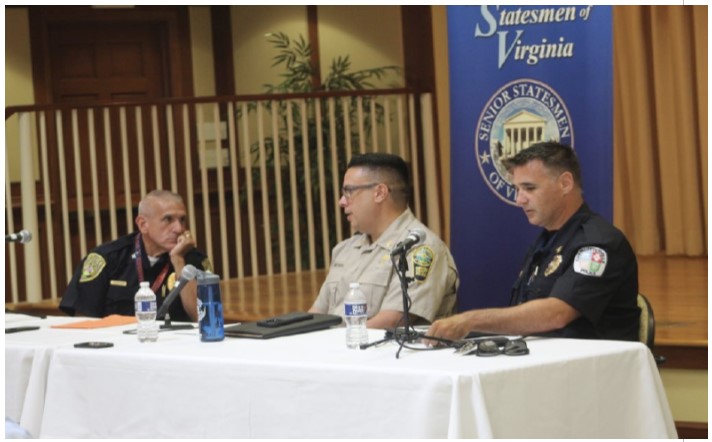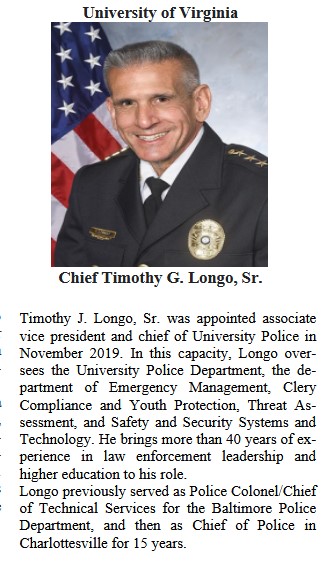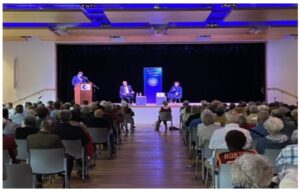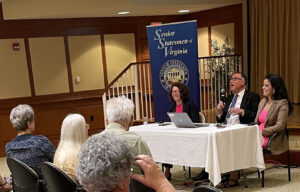
Delegate Amy Laufer, Senator Creigh Deeds and Delegate Katrina Callsen
Another standing-room-only crowd listened intently and asked great questions as our two VA Delegates and VA Senator shared a General Assembly Update…an annual benefit for SSV members.
Delegate Katrina Callsen (54th House District, all of City and small part of Albemarle County in urban ring) serves on Courts, Finance, and Local Government Committees; introduced 14 bills. She is very proud of the Kinship For Foster Care legislation she authored. Katrina was named the “Freshman Delegate of the Year,” by the 34 first-time delegates. She continues to work on probation reform, residual marijuana possession reform (from felony to misdemeanor) and removing guns from college campuses.
Delegate Amy Laufer (55th House District, remainder of Albemarle County) serves on Finance, Education and Agriculture/Chesapeake/Natural Resources Committees. She is most proud of her work on women’s health issues and agriculture. She continues to work on safe gun controls and agriculture issues, as well as disability issues.
Senator Creigh Deeds (11th Senate District, serves all of Albemarle County and the City of Charlottesville). He is the second longest-serving member of the VA Senate and serves on the Budget Conference Committee, as well as Commerce and Labor (chair), Courts of Justice, Finance/Appropriations, and Privileges/Elections/Rules Committees. He counts the appointment of two new State Corporation Commission members (with 3 members total) as a major accomplishment. He continues to work on the Budget, safe gun controls, and mental health issues.
All three shared their support for increased higher education funding and increased health care workers funding in the budget; both included higher salaries. All three noted that working with the Governor’s office has been challenging, as this Governor has vetoed 153 bills of 1,046, amended 116 bills of 1,046, and signed 777 bills of 1,046. He then added 242 more amendments to the first budget bill which was passed with significant bi-partisan support. Rather than address the 242 amendments, the VA House and Senate decided to create a second budget bill, which will be addressed at a Special General Assembly session on May 13th.
They agreed that it is imperative that the budget not be vetoed, as that would cause VA to lose its AAA bond rating. Thus, the General Assembly decided to create an entirely new budget for General Assembly passage and forwarding to the Governor for signature.
All three closed by expressing appreciation for those who attended and the importance of communicating citizen views and concerns with them. All three have newsletters available to constituents. They look forward to hearing from YOU.
Delegate Callsen also provided this selection of bills passed that have direct impact on senior citizens:
• A bill to create the Virginia Memory Center to collect information and provide assistance with Alzheimer’s disease and their families. (HB1455 Carr) – Passed
• A new law to fight financial exploitation of seniors by allowing banks to train staff on how and report suspected cases of financial abuse. The law also allows financial institutions to list trusted persons who may be contacted in cases of suspected elder abuse. (HB692 Mald) – Passed
• Legislation to improve the continuity of health care for patients by prohibiting insurance retroactively denying a previously approved authorization when a patient is switching insurance policies. (HB1134 Willett) – Passed
• Legislation to require more training for firefighters and first responders in helping those w/Alzheimer’s disease or dementia. (HB933 LeVere Bolling) – Passed
Two bills that did not pass and may be of interest:
• A bill to create a Drug Price Affordability Board which would have the authority to set up limits on certain prescription medications. (HB570 Delaney) – Vetoed
• A bill to allow IDs issued by senior living facilities be used for voting. Many people living in senior communities or group homes no longer have a need for a Driver’s License so this would allow residents to use their community ID for voting. (HB26 Reid) – Vetoed
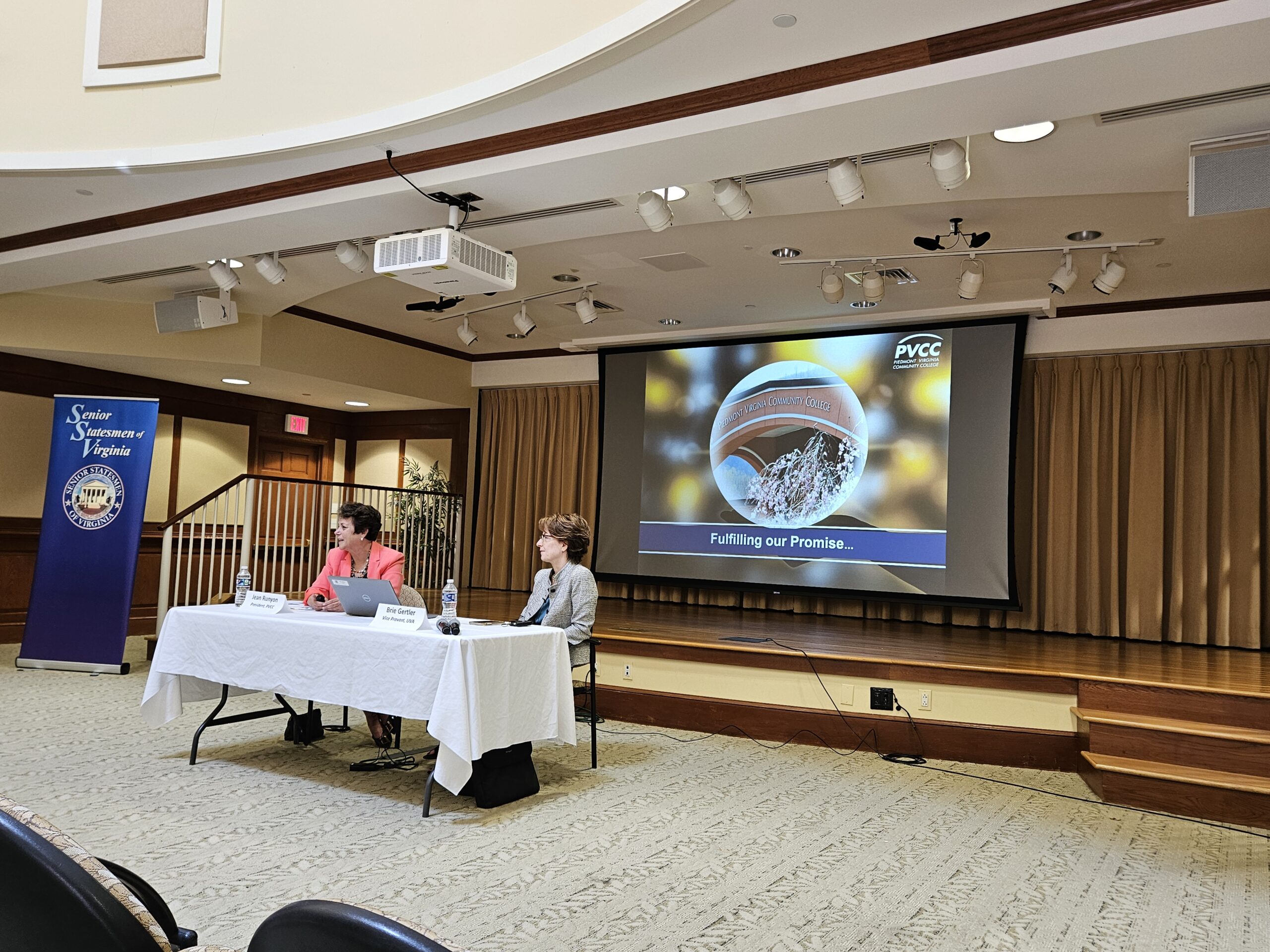






 Libby Jones has an impressive career spanning over a decade in animal welfare, veterinary medicine, and zoology, including pivotal leadership roles at influential organizations such as the Humane Society of Charlotte, Guilford County, and her most recent position as Chief Operations Officer at Seattle Humane, Jones brings a wealth of invaluable experience to her new role.
Libby Jones has an impressive career spanning over a decade in animal welfare, veterinary medicine, and zoology, including pivotal leadership roles at influential organizations such as the Humane Society of Charlotte, Guilford County, and her most recent position as Chief Operations Officer at Seattle Humane, Jones brings a wealth of invaluable experience to her new role. SSV Board Member Sue Liberman introduced our November speaker, Doris Gelbman, and she shared a most informative presentation on “Avoiding Scams.” Attorney Gelbman practices elder law exclusively, and is a member of the National Academy of Elder Law Attorneys.
SSV Board Member Sue Liberman introduced our November speaker, Doris Gelbman, and she shared a most informative presentation on “Avoiding Scams.” Attorney Gelbman practices elder law exclusively, and is a member of the National Academy of Elder Law Attorneys. 



